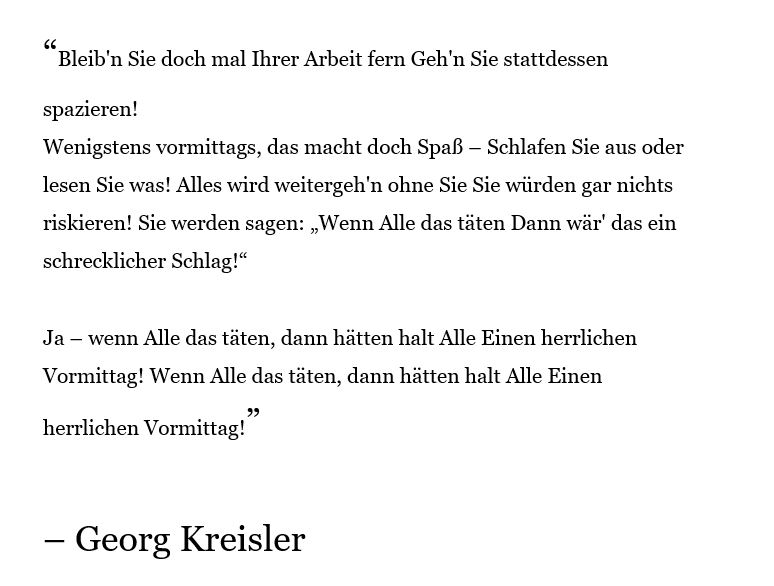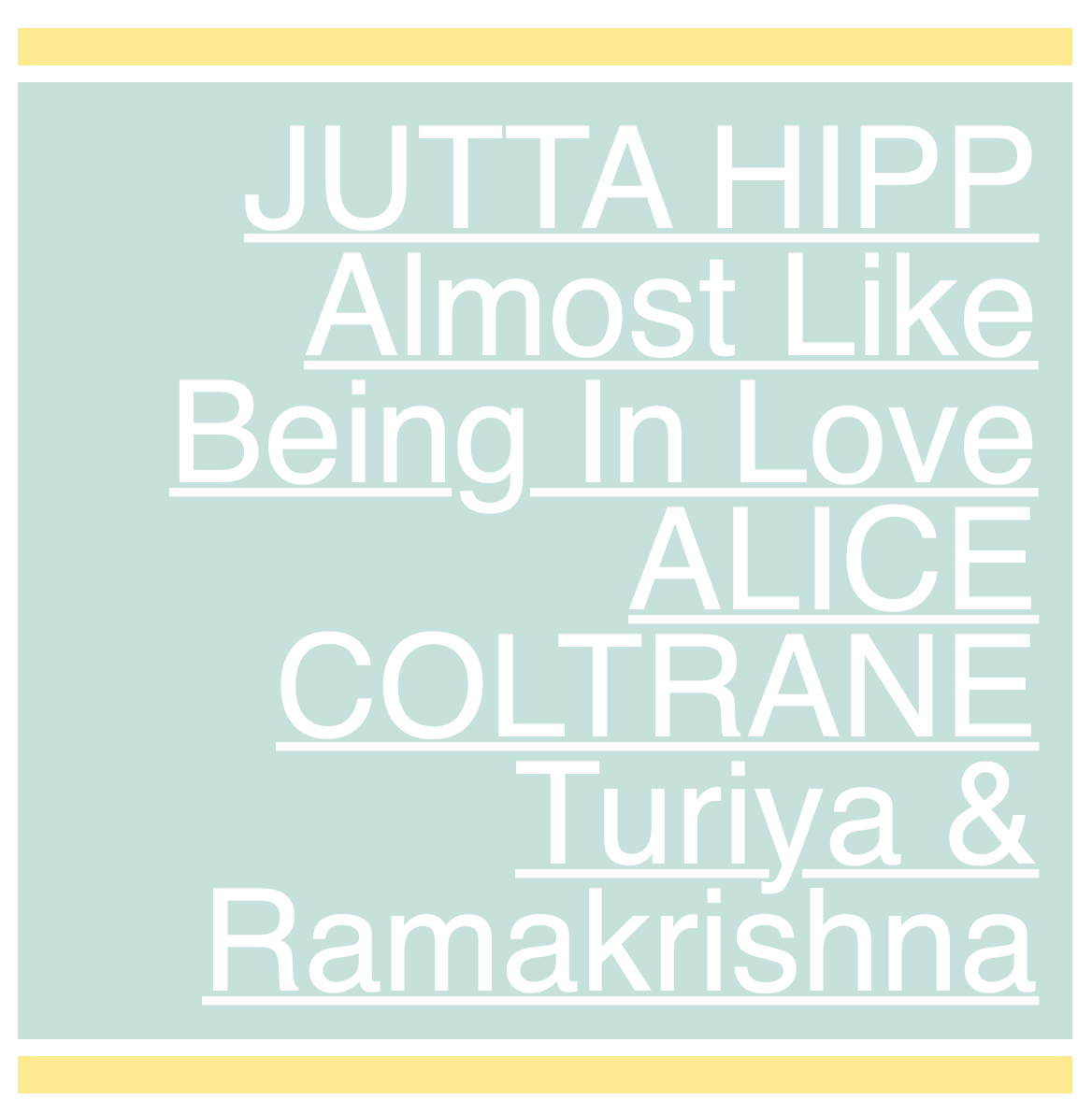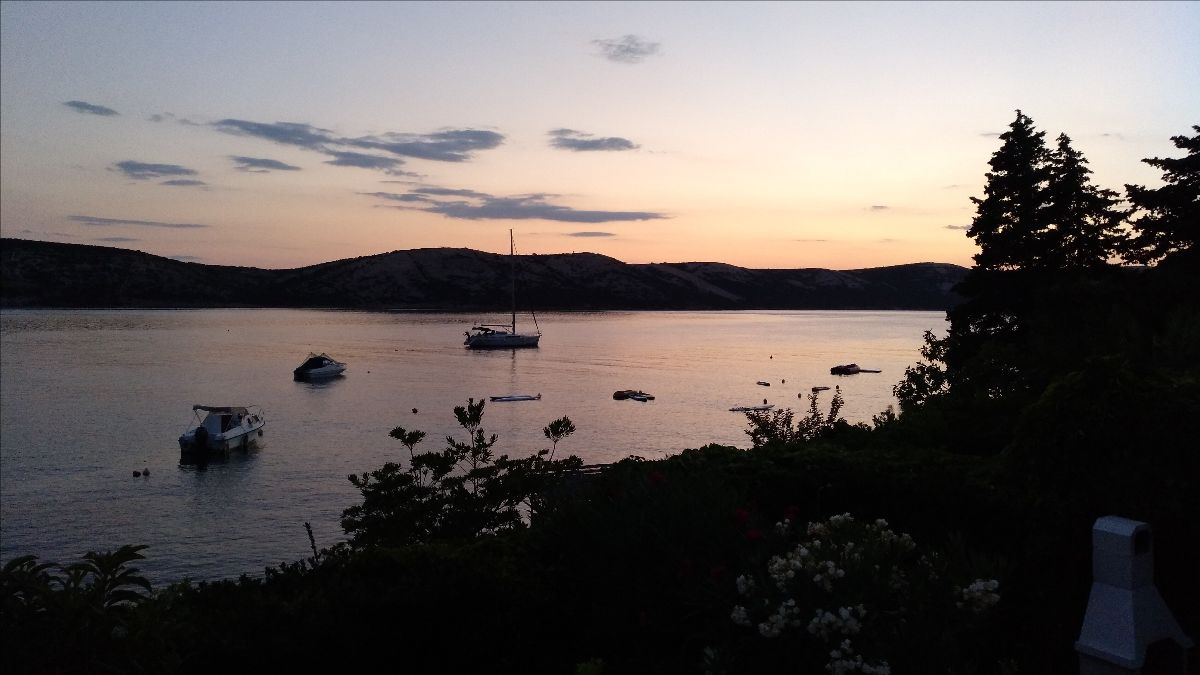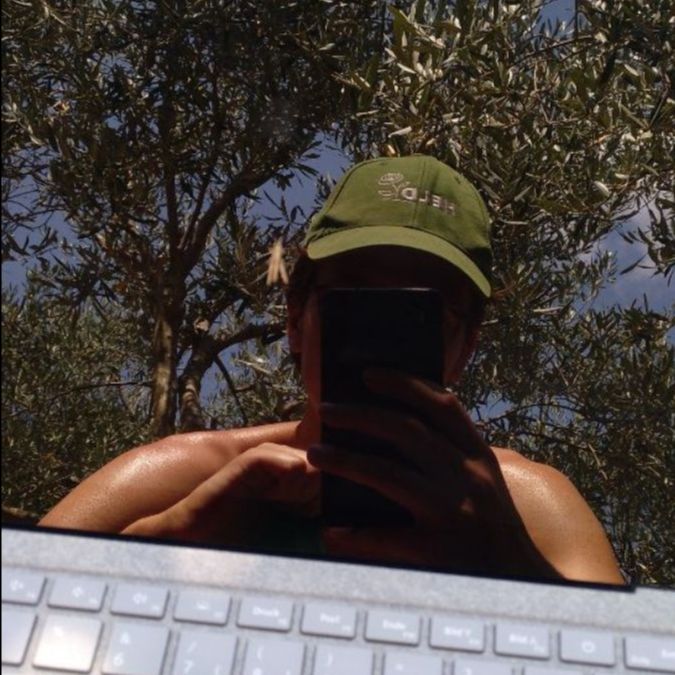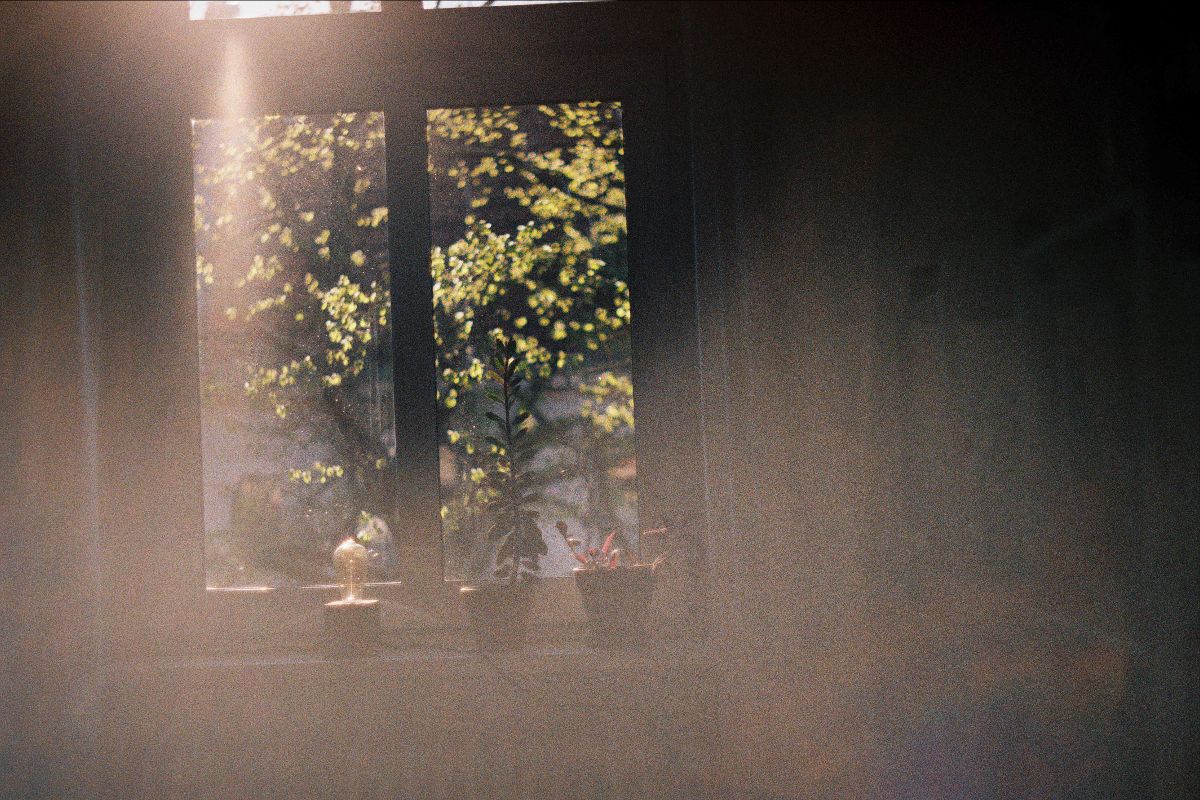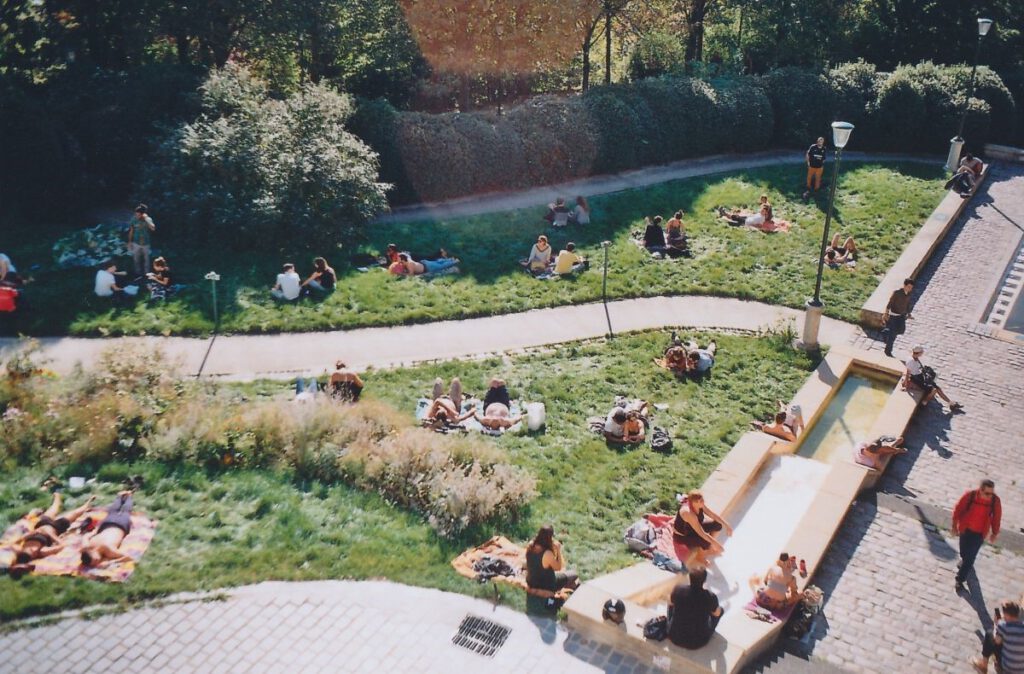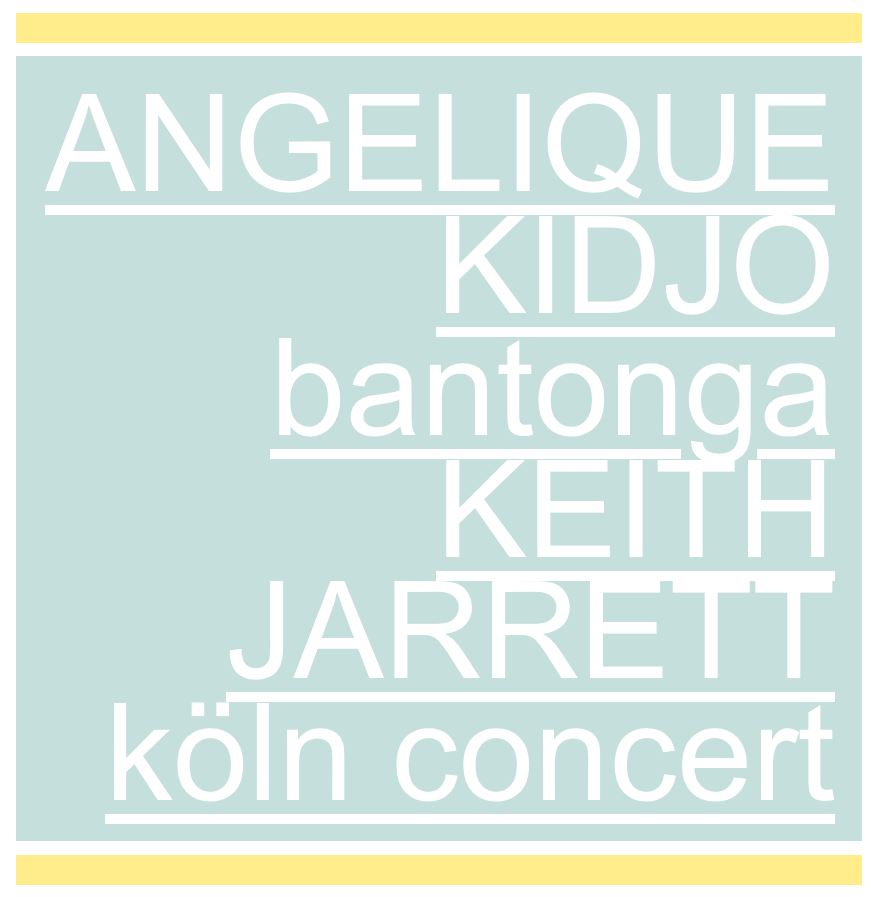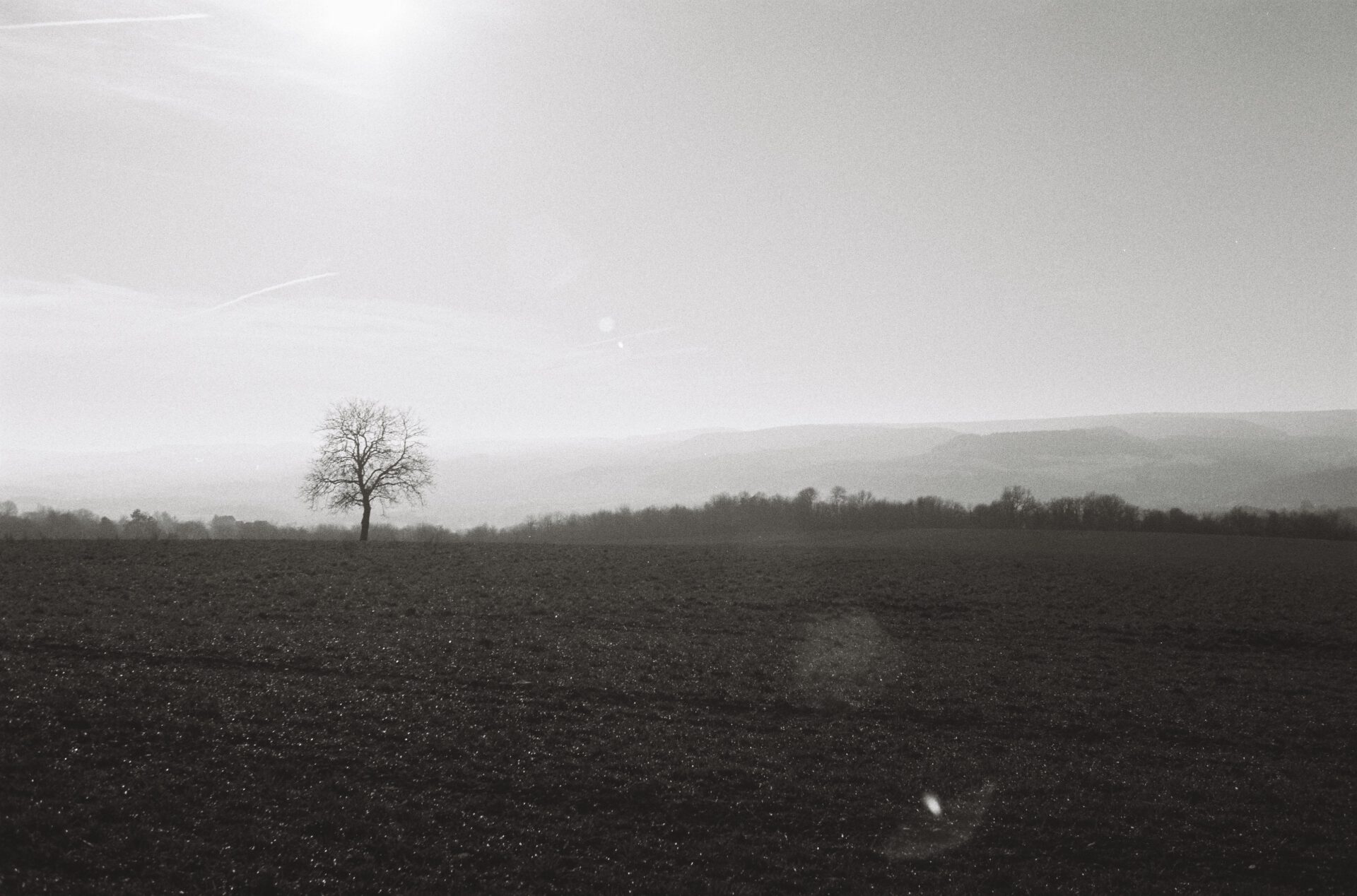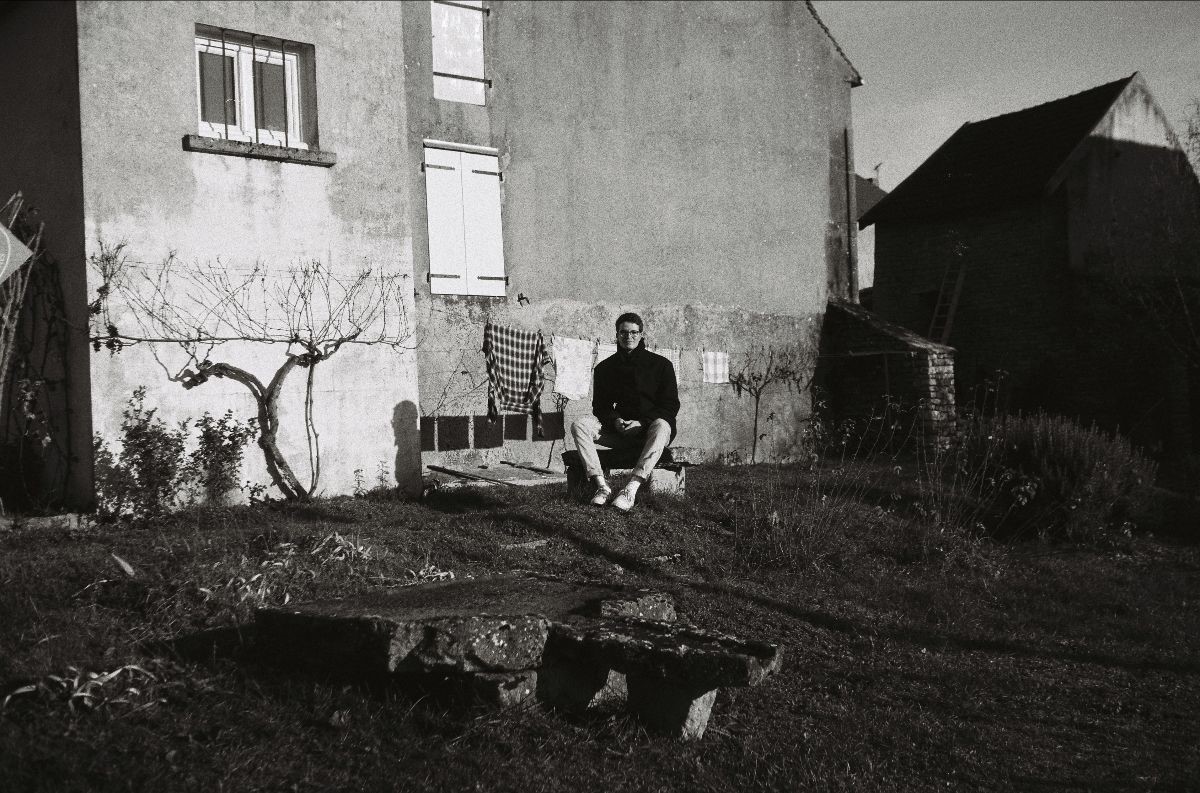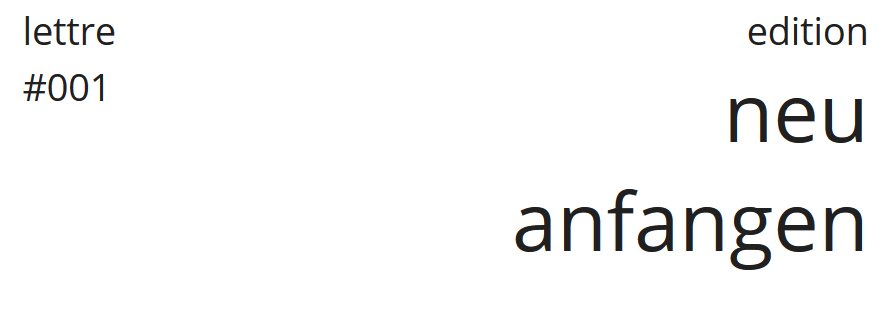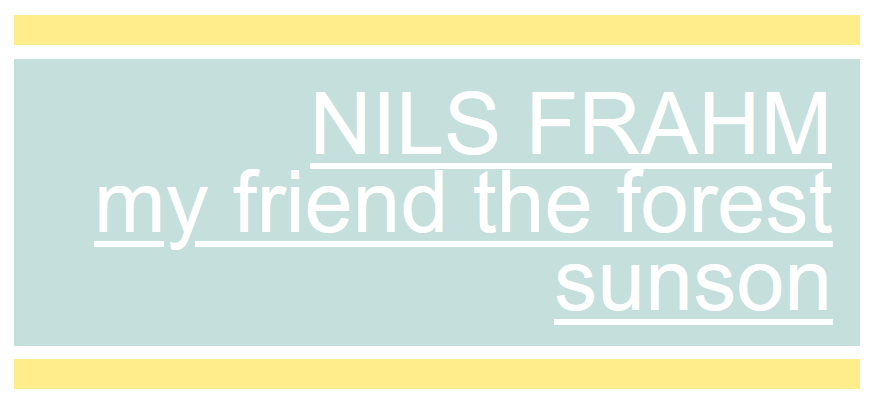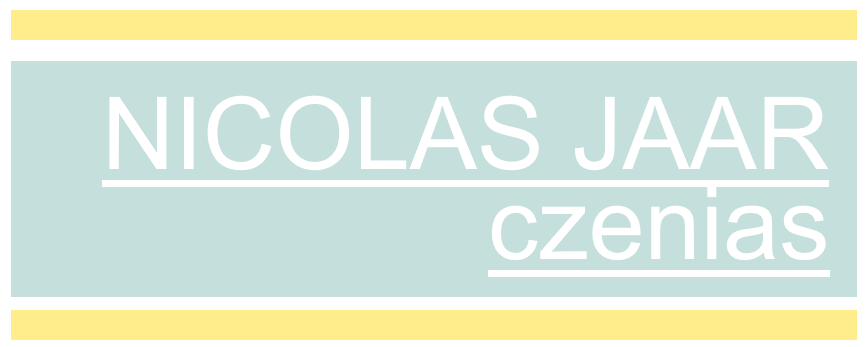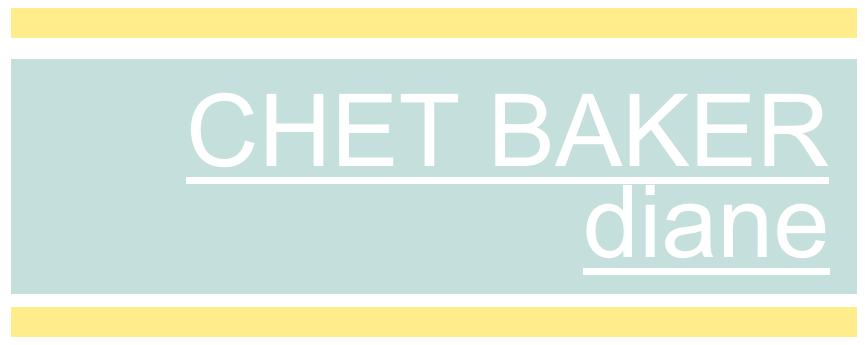Imagine you are dancing in the woods, just for yourself. Dans la foret je te retrouve à l'heure opportuneUn rendez vous improvisé sous la luneSourires crispés, situation compliquéeJe sens ton souffle qui me frôle le couUn pistolet chargé me caresse la joueTu me dis...
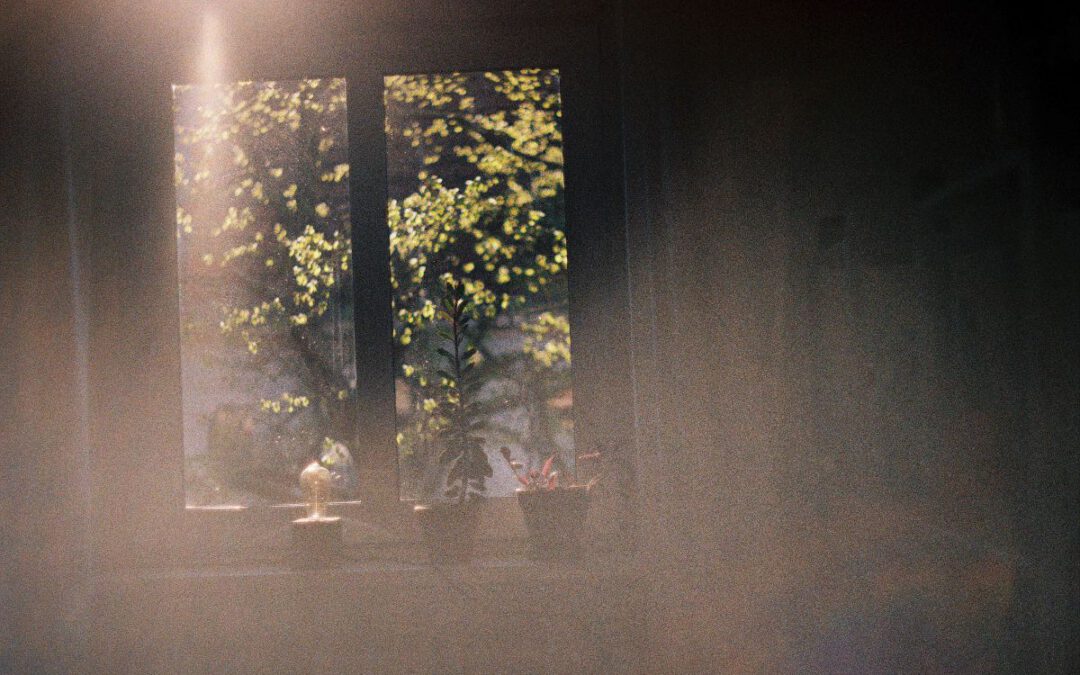
lettre #004 edition: being lazy
lettre #004 edition: being lazy
Written by
Willkommen zum Newsletter von kollektiv individualimus!
Welcome to the newsletter of kollektiv individualismus! Please click here for the english version.


Bonjour!
Dies soll ein kleines Plädoyer werden. Ein Bekenntnis zum Faulenzen, eine Ode an die Freude des Zurücklehnens. Hoffentlich sind bei Ihnen jetzt, wo wir über Faulheit sprechen, nicht gleich alle Sicherungen durchgebrannt. Doch erst mal heißen wir Sie herzlich willkommen zu der vierten Ausgabe unseres kleinen Newsletters. Wir hoffen, dass Sie sich hier immer noch wohlfühlen. Sollte das nicht der Fall sein, melden Sie sich bitte umgehend. Abonnentenzufriedenheit nehmen wir sehr ernst. Und nun steigen Sie ein, die Fahrt geht gleich los.
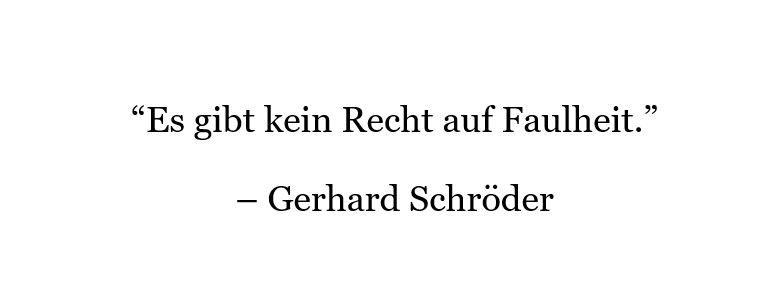
Steile These: Wir müssen uns feiern fürs Nichtstun, damit Faulenzen wieder cool wird. Damit wären wir auch gleich beim eigentlichen Problem. Faulenzen ist verpönt, was dazu führt, dass wir es verlernen. Unsere Welt ist auch verdammt gut darin, uns das Faulenzen extrem schwer zu machen. Überall Unruhe, die To-do-Listen sind lang, da bleibt keine Zeit zum Faulenzen. Es ist ein Skill, den wir uns zurückerobern müssen. Wir merken selber, wie schwer uns das fällt. Denn wenn wir verlernt haben überhaupt nichts zu tun, einfach zu träumen oder aus dem Fenster zu starren, dann ist Faulenzen nicht mehr intuitiv. Es geht genau nicht darum, wie man am effektivsten abhängen kann oder in fünf Minuten den Stress einer ganzen Woche weg zu meditieren.
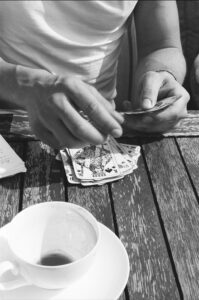
Vielmehr liegt es doch in der Natur des Nichtstuns, dass man sich mit der eigentlichen Realisation dessen gar nicht befassen soll. Faulenzen hat man gemeistert, wenn man sich keine Gedanken mehr darüber macht. Man faulenzt einfach. Einfach da sein für diesen Moment. Ende.
Moment mal. Sozialschmarotzertum, Hippie-Gutmensch und Leistungsverweigerung? Nö. Wir fragen uns einfach, ob wir die Untätigkeit nicht zu Unrecht verteufeln? Sich einfach mal bedudeln lassen von schöner Musik (dazu haben wir übrigens eine klasse Playlist kreiert), spannend-langweilige Dokus gucken (hier oder hier) oder nur daliegen und langweilen. Produktivität verabschieden, ablegen. Noch eine Idee: Ein ganzes Wochenende mit den Liebsten Karten spielen, einfach so.
Faulenzen funktioniert zum großen Teil außerhalb von bestehenden Normen. Weniger Dinge, weniger Bedürfnisse, weniger Konsum, dafür mehr Natur, mehr Zeit, Konzentration auf das Wesentliche. Ziemlich cool.
Über das Faulenzen nachzudenken kann uns auch helfen, neu darüber zu reflektieren, wie wir arbeiten und gut leben wollen und ultimativ auch darüber, wie wir auf einem Planeten leben sollen, den wir so übernutzen, dass wir eigentlich drei von ihm bräuchten. Das klingt jetzt erst mal nach einer ziemlichen großen Aufgabe für eine so unschuldige und zärtliche Tätigkeit wie das Faulenzen, doch verstehen Sie es eher als einen Türöffner.
Wir sehen aber bereits: Das Faulsein hat eine gewisse politische Brisanz. Faulenzen kann als theoretisch-kritischer Gegenbegriff zu jenem allgegenwärtigen Geist des Marktes werden. Wenn wir fragen, ob wir mehr Faulenzen sollten, dann suchen wir nach Möglichkeiten der (Neu-)Gestaltung des sozialen und politischen Gemeinwesens.

Musik N°1
Glass Animals – Wyrd
Ananas Vibes, Jungle Sounds und musikalische Abhängeinladung. Diese Band begleitet mich schon sehr lange und ist bis heute in meiner hot rotation. Ich kenne nichts, dass so klingt wie Glass Animals. Mystisch und minimalistisch aber voll gespickt mit kleinen Feinheiten, die es zu entdecken gibt.
Vor kurzem haben sie ein sehr höhrenswertes Album rausgebracht aber ihr bestes Album bleibt weiterhin ihr Erstes: ZABA. Auf dem auch Wyrd zu finden ist.
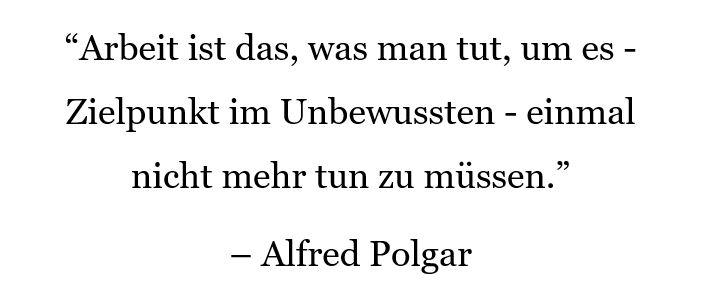

Schwerpunkt.
Kennen Sie Heinrich Bölls „Anekdote zur Senkung der Arbeitsmoral“? Nein? Dann lesen Sie bitte diese großartige kurze Erzählung am besten gleich hier vollständig und überspringen Sie die hier folgende gekürzte Version.
„Irgendwo an einer Küste in Westeuropa: Ein ärmlich gekleideter Fischer liegt am Hafen und döst. Ein reicher Tourist kommt vorbei, knipst einige Fotos und fragt mehrmals, ob es dem Fischer gut gehe und weshalb er denn nicht in See steche, um einen guten Fang zu machen. Als der Fischer ihm antwortet, dass er heute schon einen kleinen Fang gemacht habe, rechnet ihm der Tourist vor, was er sich mit noch mehr Beutefängen alles kaufen könne: in einem Jahr einen Schiffsmotor, in zwei Jahren ein zweites Boot, dann einen Kutter, ein großes Kühlhaus samt Räucherei und ein Fischrestaurant – und schließlich eine riesige Marinadenfabrik, mit der er die ganze Welt beliefern könne. Der Fischer bleibt sichtlich unbeeindruckt, was den Touristen umso nervöser macht. Was denn dann passiere, will der Fischer wissen: ‚Dann‘, sagt der Fremde mit stiller Begeisterung, ‚dann könnten Sie beruhigt hier im Hafen sitzen, in der Sonne dösen – und auf das herrliche Meer blicken.‘ – ‚Aber das tu ich ja jetzt schon‘, sagt der Fischer, ‚ich sitze beruhigt am Hafen und döse, nur Ihr Klicken hat mich dabei gestört.‘ Tatsächlich zog der solcherlei belehrte Tourist nachdenklich von dannen, denn früher hatte er auch einmal geglaubt, er arbeite, um eines Tages einmal nicht mehr arbeiten zu müssen, und es blieb keine Spur von Mitleid mit dem ärmlich gekleideten Fischer in ihm zurück, nur ein wenig Neid.“ (Zeit Online entnommen)
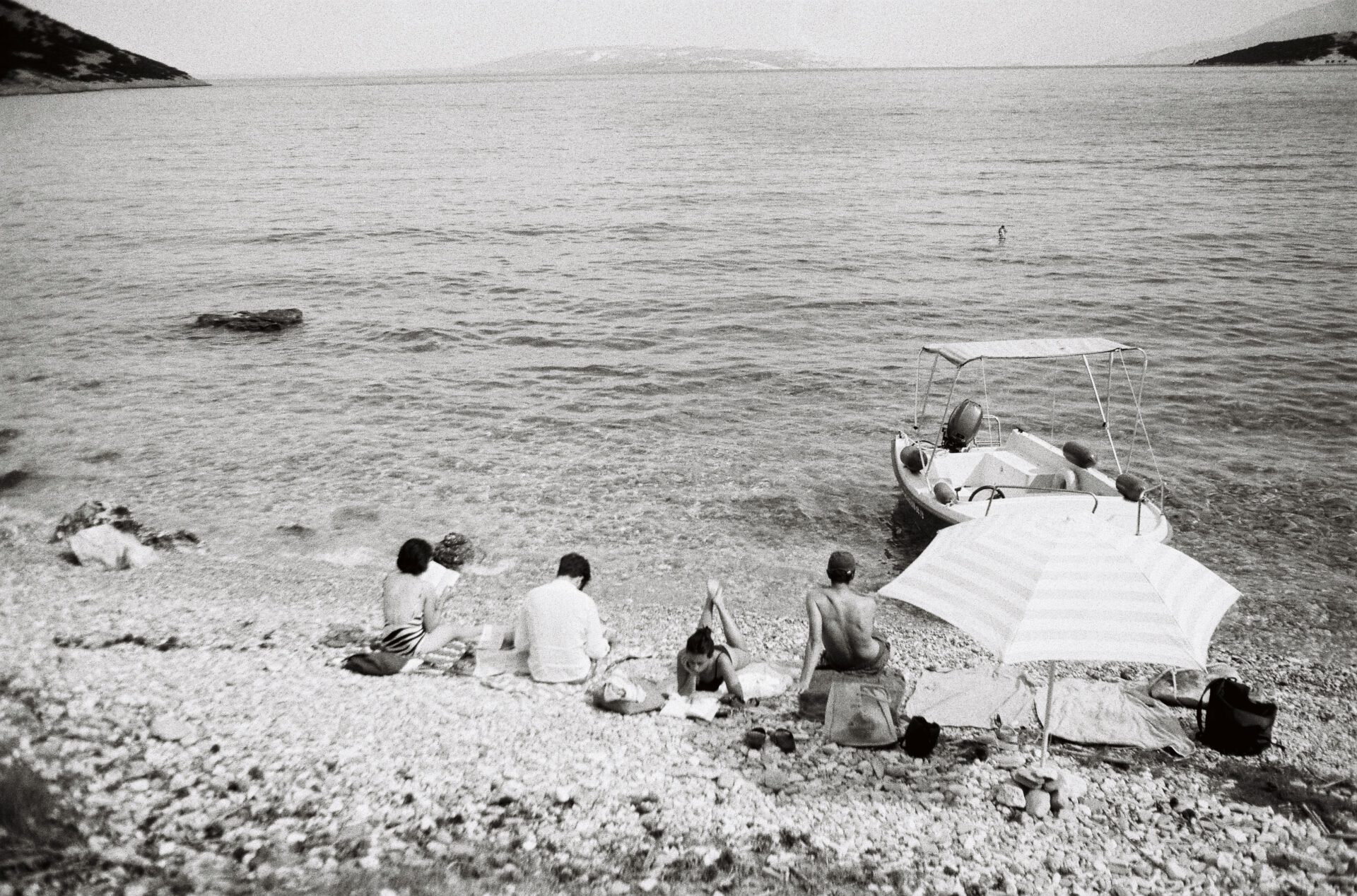
Faulenzen deluxe Sommer, 2020
In dieser kleinen Erzählung steckt eine große Wahrheit. Zum Glück braucht es nicht viel, nur das Wesentliche. Und: Wir leben nicht, um non-stop zu arbeiten, sondern wir arbeiten, um dann ein gutes, erfülltes Leben zu führen. Im Übrigen arbeitet wahrscheinlich kein Lebewesen so viel wie der Mensch. Wir sind negativ formuliert Spitzenreiter darin unsere Lebenszeit mit (Erwerbs-)Arbeit zu vernichten. Zugegeben, es gibt auch wirklich erfüllende Arbeit, die Sinn stiftet und Menschen zu Persönlichkeiten macht und ja, es gab schon üblere Zeiten, wo noch mehr gearbeitet wurde (in den 1870er-Jahren 72 Stunden die Woche z. B.).
Wir könnten uns aber ein Vorbild nehmen am Koalabär – das genaue Gegenteil von einem Arbeitstier. Ein Koalabär isst ein paar Eukalyptusblätter am Tag und döst dann einfach. Wenn sie nicht um die 18 Stunden am Tag schlafen können, sterben die Tiere vor Erschöpfung. Jetzt können Sie natürlich zu Recht sagen, dass der Koalabär auch nicht Venedig oder Machu Picchu konstruiert hat – guter Punkt. Aber darum soll es ja gar nicht gehen. Der Koalabär perfektioniert ein Konzept, das von Ökonomen als „Zieleinkommen“ oder auch „Suffizienzwirtschaft“ bezeichnet wird. Suffizient zu wirtschaften bedeutet, die natürlichen Grenzen unseres Planeten zu berücksichtigen und möglichst wenig Ressourcen zu verbrauchen. Und hier müssen wir Menschen noch große Fortschritte machen. Vielleicht tauschen wir schon bald wieder von Profit und Wachstum zum „Zieleinkommen“ zurück, weil wir keine andere Wahl haben.

Musik N°2
Fenster – The Room (Album)
Die Band Fenster ist mir ein kleines Rätsel, das zeigt, wie viel Musik im Leben versteckt ist, die wir nicht mitbekommen, weil sie nicht großartig vermarktet wird. Fenster ist eine Band, die man live sehen sollte und deren Musik man idealerweise am Stück konsumiert, also im ganzen Album. Dazu stehen einem zwei zur Verfügung: The Room und Emocean, beide gelungen, wobei Letzteres eigentlich ein Soundtrack zu einem von der Band selbst produzierten Film ist. Also hören Sie mal rein, ich habe Fenster über ein Konzert im HAU entdeckt und war ziemlich beeindruckt von ihrem coolen Auftritt. Die Bar vorm Konzertsaal wurde an diesem Januartag von den hippesten Leuten Berlins bedrängt (hach, Konzerte!). Es war mehr eine Art Freundeskreistreffen von Menschen, die etwas mehr investieren in Musik als die Charts durchzuhören oder sich mit Spotify Weekly Mixtapes irgendwie durch die Woche zu schaukeln. Natürlich eignet sich die melancholisch-spacige Musik von Fenster super zum Faulenzen. Psych-Pop, Synthesizer-Arpeggios (gebrochene,Akkorde), Funk, R&B-Groove, warme Synthesizer, all das findet man in der verspielten, teils tanzbaren Musik von Fenster. Their sound is a window framing psychedelic, groovy, hypnogogic, playful pop. Kommen Sie in The Room, viel Vergnügen!
Relax statt Rolex.
(Slogan entliehen vom Transform Magazin)
Faulenzen ist Luxus, behandeln wir es auch als solchen! Wir müssen das Faulenzen wieder mehr wertschätzen, sowohl gesellschaftlich als auch ganz einfach für uns selbst. Wir sollten uns öfter davon frei machen, etwas tun zu müssen, und ebenso sollten wir anderen erlauben, sich diese Freiheit auch zu gönnen. Aber wenn das alle täten? Bestehen Sie aufs Faulenzen. Le droit à la paresse. Das ist ein äußerst befriedigendes Gefühl, stellen sie es sich vor wie einen ganz kurzen Urlaub. Freuen Sie sich des Lebens. Die Notwendigkeit von Urlaub scheint uns meist einleuchtend und weitesgehend akzepiert, doch sich von 14 bis 15 Uhr einfach mal hinzulegen erzeugt mindestens mal Stirnrunzeln. Diese Einsicht bringt widerum unsere Stirnfalten zum Vorschein. Das ergibt doch wenig Sinn, von der bewiesenen Notwendigkeit kurzer Pausen mal ganz abgesehen
Es ist doch paradox: Wir streben insgeheim nach Faulheit, aber preisen hemmungslos lautstark die Arbeit.
Fragen Sie doch mal Ihre Freunde, wann sie das letzte mal aktiv gefaulenzt haben, und leisten Sie bei Bedarf Nachhilfe oder Beistand. Faulenzen hilft auch dabei, einen kühlen Kopf zu bewahren, überhitze Gemüter zu beruhigen oder über Dinge noch mal ein zweites Mal nachzudenken. Es ermöglicht, überhaupt erst mit sich selbst in Kontakt zu kommen. Es hilft, den manchmal nötigen Abstand zum Affekt zu bekommen. Nach einer kurzen Runde im Park sehen die Dinge schon oft ganz anders aus, mit ein bisschen Glück hat es sich ganz erledigt. Das fördert auch die eigene Lässigkeit.
Lehnen Sie sich also zurück und legen Sie Ihre Lasten beim Eintreten in diese wundersame Welt ab. Faulenzen ist angesagt! Machen Sie es gut.
Jan & Felix
Disclaimer: Von dauerhaftem Faulsein ist ggf. abzuraten, schon allein aus lebenspraktischen Gründen. Zu viel Langeweile ist schließlich auch nicht so gut, aber das wollen wir an dieser Stelle einfach mal ignorieren.

Musik N°3
Metronomy – The Bay & The Look
Faulenzen hat auch viel damit zu tun, den allgegenwärtigen Drang zur Perfektion abzulegen. Faulenzen kennt keine Maxime, Faulenzen sollte keinem Ideal folgen oder sich bestimmten Konventionen beugen. Es ist eine Sache des persönlichen Gefühls. Faulenzen sollte sich nicht kapern lassen, wie der Mindfullness Trend zeigt, was sehr scharf im britischen Guardian analysiert wird. Das gilt natürlich auch für den gewählten Ort an dem das Faulenzen stattfindet. Paris, London, Tokyo oder Berlin sind spannende, angesagt Orte, an denen coole Kids coole Dinge tun. Doch das sollte uns beim Faulenzen nicht weiter interessieren. Im Gegenteil, der Trubel und der Hype der Stadt kann dem Faulenzen sogar Hürden in den Weg stellen (wir verweisen an dieser Stelle auf unseren Newsletter zum Thema Stadtflucht). Das hat auch Metrononmy verstanden und ein Lied über Torbay geschrieben, einen scheinbar unscheinbaren Ort an der Küste Englands.
It feels so good
In the bay
Auch Soundtechnisch sehr gut zum Faulenzen. Nicht zu schnell, nicht zu langsam. Zum Mit-dem-Kopf-Wippen, herrlich zum Schlendern oder einfach für eine kleine Auszeit zwischendurch. Ganz nebenbei sei noch erwähnt, dass das Album English Riviera auf dem auch The Bay erschienen ist, großartig ist (den Großteil der neueren Album von Metronomy kann man sich jedoch getrost sparen). Eine gute Anspielstation ist zum Beispiel auch The Look.
Faulenzen kann man auch gut in Parks. Helsinki, 2019.

Musik N°4
Kool & The Gang – Rated X, Ruth Brown & Her Rhythmakers – I Don’t Know
Zwei Songs, die nichts gemeinsam haben, außer halt ihren mitreißenden Sound, und dass sie beide Teil des Soundtracks von Fatih Akins Soul Kitchen sind – seiner filmischen Hommage an Hamburg, die zur Zeit bei arte zu sehen ist. Kool & The Gang nutzen Sie am besten zum Aufdrehen und Ruth Brown nachdenkliches Stück, um wieder runter zu kommen. Ich habe den Film vor Jahren gesehen, ja er ist ziemlich überdreht, aber eben auch ziemlich cool, was besonders durch die gute Musik getrieben wird. Es geht es um wirklich existenzielle Dinge. Um Trinken, Essen, Feiern, Tanzen, um Heimat, Liebe und Freundschaft. Wenn Sie noch nicht so ganz frei Faulenzen können, sehen Sie diesen Film und lassen Sie sich von der Musik anstecken und den Menschen der Soul Kitchen den Kopf verdrehen.
The end.
Das war unser vierter Newsletter. Diesmal pünktlich im August. Hat es Ihnen gefallen? Wir freuen uns über Feedback, etwaiges Weiterempfehlen und auch über neue Abonnements. Tatsächlich wird sonst niemand von diesem Newsletter erfahren, da wir keine Werbung machen. Es bleibt also nur Ihre Empfehlung. Wie es so schön heißt: Subscribe now. Newsletter haben nachwievor etwas von Spam, Werbung, Nötigung. Leider, denn damit wollen wir rein gar nichts zu tun haben. Die Email zum lettre heißt: newsletter@kollektivindividualismus.de. Und im Internet kann man nach wie vor unsere Website besuchen, abhängen und staunen.
Wir sagen à bientôt und bleiben Sie uns gewogen.

Bildcredits: © Jan Nitschke © Felix Vieg © Felix Vieg © Jan Nitschke
Copyright © 2020 Kollektivindividualismus,
https://kollektivindividualismus.de/
All rights reserved.
mailchimp archive
soundtrack der woche
SdW
SdW #234 Lescop – La forêt
SdW #233 War – Low Rider
War ist eine amerikanische Funk-Band aus dem Jahr 1969, die Elemente verschiedener Stile wie Rock, Jazz, Reggae und Latin kombiniert. Für alle Low Rider. https://songwhip.com/war/low-rider Mehr Soundtrack der WocheOther SdWSITEMAP Soundtrack der...
SdW #232 Billy Paul – Me and Mrs. Jones
Einfach eine wunderbare Liebesaffäre zwischen Billy und Mrs. Jones. Später einmal gesungen von Amy Winehouse. Und unser Soundtrack der Woche - irgendwann in 2020. Oder schon 2021? Mehr Soundtrack der WocheOther SdWSITEMAP Soundtrack der Woche...
Join Our Newsletter
Wir hassen Spam. Einmal im Monat gibt's eine tolle Email. Sie können jederzeit Ihr Newsletterabonnement ändern.
We hate Spam. Once a month we will send you a beautiful email. You can always change your subscription preference.
Entstanden in Bonn
made w/ love
© 2020



